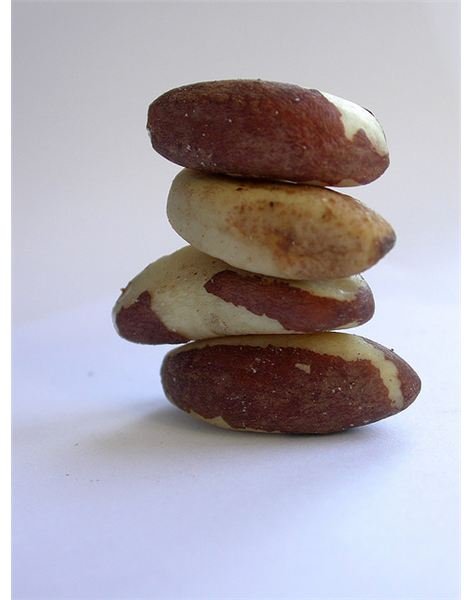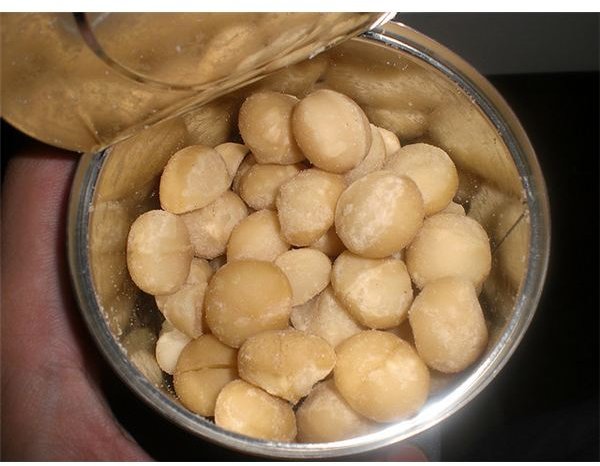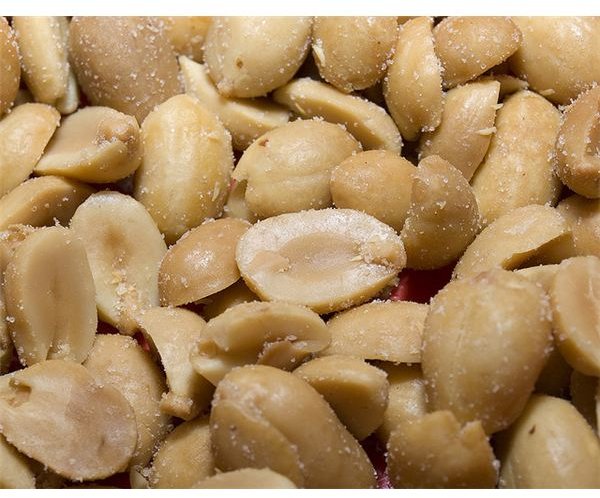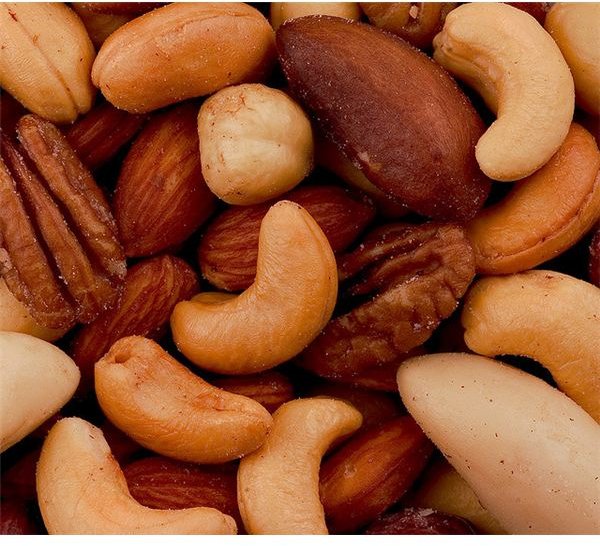A Guide to the Nutrition of Nuts: Almonds, Walnuts & Cashews
What’s Great About Going Nuts?
Nuts are often dismissed as being “too high in fat” before the nutritional aspects of nuts are looked at in a balanced way. Obviously, the nutrition of nuts varies depending on the type of nut (of which there are many), but overall, they are a tremendous source of protein, making them ideal for quick energy snacks, as well as giving vegetarians complex proteins they are missing from not eating meat.
The fact that nuts are a higher fat food should be considered, but it is important to remember that the fat they contain is heart-healthy fat of the unsaturated variety, and may help to lower LDL, which is also known as “bad” cholesterol.
Nuts are also recommended to be taken four to five times a week on the DASH dietary plan, which is a diet to help lower blood pressure/hypertension.
Let’s consider the nutrition of nuts depending on the variety.
Walnuts
All nuts are high in is protein, which makes them an especially good addition to a vegetarian diet. Consuming just one serving of walnuts (one-quarter cup or 25g) gives you almost eight percent of your daily protein requirements.
While a one-ounce serving of walnuts contains 147 calories from fat, only 14 of these calories are from saturated fat; walnuts contain no trans fats. In total, walnuts contain 163 calories per serving, but this is somewhat offset by their low saturated fat content, and a good level of dietary fiber. Just a small amount of walnuts (one ounce) can meet almost seven percent of your daily needs with regards to dietary fiber.
trans fats. In total, walnuts contain 163 calories per serving, but this is somewhat offset by their low saturated fat content, and a good level of dietary fiber. Just a small amount of walnuts (one ounce) can meet almost seven percent of your daily needs with regards to dietary fiber.
While walnuts are a very good source of manganese, and a good source of copper and tryptophan, it is in the field of omega 3 fatty acids that they really shine. One ounce of walnuts provides the recommended daily amount of omega 3 fatty acids. Omega 3s are necessary for human health, but they have to be gained through food; the body can’t produce them. The American Heart Association recommends the consumption of omega 3-rich foods, as they have been shown to reduce the risk of heart disease.
Almonds
All nuts score high on the calorie charts, and even though the almond is technically a seed, it too is a high scorer. About 206 calories of energy can be gained from a quarter cup of almonds. This is a quick, easy, and nutritious way to snack, especially if you are burning a lot of calories playing sports, walking in the cold, or climbing. You can meet 16 percent of your dietary fiber needs by eating one serving of almonds.
Although a quarter cup of almonds contains 18g of fat, 11g of this is the heart-healthy monounsaturated fat.

Almonds have the lowest saturated fat content of all nuts at just 1g per oz.
Almonds are a concentrated form of protein. One serving (one-quarter cup) contains over 13g of protein (15 percent of your recommended daily amount), which is 2.5 times more protein than can be gained from eating one egg.
Almonds are a food high in vitamin E, meaning they can boost your immune system and help blood flow. A study reported in the Journal of the American Association concluded that a diet rich in foods containing vitamin E could help protect some people against Alzheimer’s disease. Almonds are also a very good source of manganese and a good source of magnesium, copper, vitamin B2 (riboflavin), and phosphorous.
Cashews

Cashews contain the least amount of calories per serving than other nuts (along with almonds, pine nuts, and pistachios), at 160 calories for a 1oz serving. While 16g of fat can be found in a serving of cashews, only 3g of this is saturated fat.
Dietary fiber in cashews isn’t as high as in many other nuts, but a quarter cup serving still provides four percent of your needs for the day. The cashew nut is very rich in protein - just a quarter cup of cashews provides over 5g of protein - over 10 percent of your daily requirement.
Cashews are a very good source of copper, as well as being a good source of magnesium, tryptophan, and phosphorous. Copper in the body is necessary to maintain healthy bones and connective tissues.
Please continue to page 2 for more about nutrition of nuts including: Brazil nuts, macadamia nuts, and peanuts.
Brazil Nuts
While we have established that a nut nutrition fact is nuts are a higher fat food, in general, their saturated fat credentials are very good. Brazil

nuts are not an exception to this; however, if saturated fat is a consideration for you, you may want to opt for a different nut, as Brazil nuts do have the highest saturated fat content at 5g per 1oz/28g. (Tip: Almonds are the best for low saturated fat at 1g per ounce).
Carbohydrate levels for all nuts are very low, but Brazil nuts are the lowest of all nuts, at just 3g per oz. However, when we look at calorie content, the Brazil nut does not score so well. One serving size, or six to eight Brazil nuts, contains 186 calories.
Brazil nuts are extraordinarily good for providing dietary fiber, as just six nuts can give you 12 percent of your fiber needs for the entire day. They are not as high in protein as some other nuts, but Brazil nuts contain 4g of protein per 1 oz/28g serving.
Magnesium content is one of the Brazil nuts strong points, with one serving giving you 25 percent of your daily requirement. Magnesium is especially important for maintaining healthy teeth and bones. Sufferers of angina, diabetes, high blood pressure, and menstrual pain can benefit from magnesium as well.
Macadamia Nuts
The most widely known of all nut nutrition facts is that macadamias are the most caloric of all nuts (along with pecans); macadamia nuts contain almost 200 calories for a small one-quarter cup serving. Of course, their fat rating is high too; a single ounce serving of macadamia nuts provides 22g of fat, but only 3.5g of this is saturated fat.

Macadamia nuts provide just 2g of dietary fiber per serving and have the least amount of protein of any nut variety, providing just 2g per ounce. If protein is a consideration for you, head to a more protein rich variety of nut like the peanut or almond.
Manganese rich, macadamias furnish 45 percent of your daily requirement from a one-quarter cup serving, which is about 10-12 nuts/kernels. Manganese performs many important functions, most notably in the formation of cartilage and bone structure. It is also used to help the body with wound healing.
Peanuts
Peanuts are a very good source of monounsaturated fats, but

be careful, as one peanut serving is enough to make you reach 28 percent of your recommended fat intake for the day (12.5 percent saturated fat). Peanuts are no friend to the waistline in regard to calories either; a whopping 206 calories can be gained from munching your way through a quarter cup of peanuts.
Just one ounce of peanuts contains 2.4 percent of your recommended daily amount of dietary fiber, but when it comes to protein, peanuts are top scorers. On the nut nutrition charts, peanuts provide 7g of protein in a one-ounce serving, which is more than any other nut. This means you get 19 percent of your daily protein requirement from one serving of peanuts.
Peanuts are a good source of niacin (B3), folate, copper, and manganese. B3 is effective in improving circulation, and reducing blood cholesterol.
If all of the nut nutrition facts above haven’t yet convinced you of how wonderful nuts can be when added to the diet, remember that they are naturally low in salt, and are a cholesterol free food, too!
Resources & Image Credits
https://lancaster.unl.edu/food/ftmar04.htm
https://www.nhlbi.nih.gov/health/public/heart/hbp/dash/
https://whfoods.org/genpage.php?tname=foodspice&dbid=20
https://www.umm.edu/altmed/articles/omega-3-000316.htm
https://www.usm.maine.edu/wellness/special_features/walnuts_for_health.htm
https://epi.aecom.yu.edu/studies/CCA/Newsletters/NutNewsletter.htm
Images
Mixed nuts - s58y: https://flic.kr/p/7Jb7v5
Walnuts - Marco Bernardini: https://flic.kr/p/2q5nF6
Almonds - Harsha K R: https://flic.kr/p/5EpNCD
Cashews - Hellebardius: https://flic.kr/p/5LisNo
Brazil nuts - Alison Jackson-Bass: https://flic.kr/p/72Xog
Macadamia - Like the Grand Canyon: https://flic.kr/p/52yYhs
Peanuts - Martin L: https://flic.kr/p/4zNHjF
